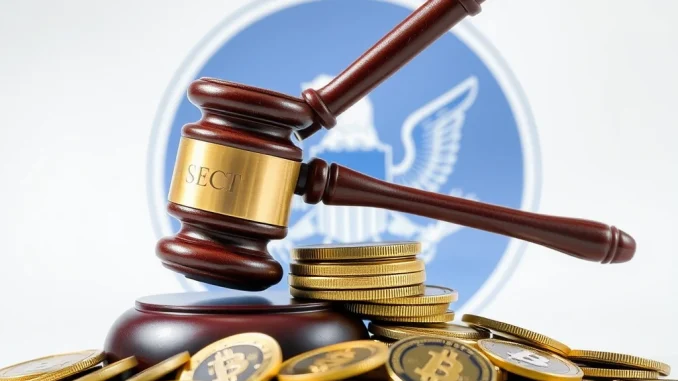
Is the Wild West era of crypto finally drawing to a close? The U.S. Securities and Exchange Commission (SEC) is stepping up its game, urging crypto firms to pull back the curtain and provide crypto disclosures that are far more detailed than before. If you’re invested in digital assets or running a crypto business, this news is crucial. Let’s dive into what this means for you and the crypto landscape.
Why is the SEC Focusing on Detailed Crypto Disclosures?
The SEC’s recent staff statement isn’t just another piece of regulatory jargon; it’s a clear signal. They’re pushing for transparency, especially when it comes to tokens that might be classified as securities. But why now, and why the emphasis on crypto disclosures? Here’s the breakdown:
- Investor Protection: At its core, the SEC’s mission is to protect investors. With the crypto market’s volatility and complexity, they want to ensure investors have access to all the necessary information to make informed decisions. Detailed crypto disclosures are a fundamental part of this protection.
- Market Clarity: The crypto space has been operating in a gray area for too long. This guidance aims to bring much-needed clarity by pushing companies to be upfront about their operations, token functionality, and investor rights.
- Proactive Approach: Ahead of their upcoming crypto roundtable on trading, this statement indicates the SEC is taking a proactive stance. They are setting the stage for more in-depth discussions and potential rule-making concerning digital assets.
- Task Force in Action: The newly formed crypto task force is already making its presence felt. This statement is one of the first outputs, showing their commitment to clarifying how existing securities laws apply to the ever-evolving world of crypto.
Decoding the SEC’s Message on Token Roles
The statement itself is nonbinding, meaning it’s guidance rather than a strict rulebook. However, it’s wise to pay close attention. The SEC is essentially saying: if your token looks, acts, and quacks like a security, you need to treat it like one and disclose accordingly. But what exactly are they looking for in these token roles disclosures?
Think of it in terms of peeling back the layers of an onion. The SEC wants to see:
- Business Operations: How does the crypto firm actually operate? What’s their business model? Who are the key players? Transparency here is paramount.
- Token Functionality: What does the token actually do? Is it just a currency? Does it grant voting rights? Does it represent ownership in something? The more details, the better.
- Related Rights: What rights do token holders possess? Are there promises of future returns? Do they have a share in profits? Any rights associated with the token need to be clearly laid out.
Essentially, the SEC is urging crypto companies to be transparent about the economic realities of their tokens. If a token offers potential returns based on the efforts of others (a key characteristic of a security under the Howey Test), the SEC will likely consider it a security.
Navigating the Complex Landscape of Securities Laws for Digital Assets
One of the biggest challenges in the crypto world is understanding how traditional securities laws apply to these novel assets. The SEC’s statement is a step towards clarity, but it also highlights the ongoing complexity. Here are some key aspects to consider:
| Aspect | Implications for Crypto Firms |
|---|---|
| Definition of Security | Still not explicitly defined for crypto. The Howey Test remains the primary framework, focusing on investment contracts. |
| Disclosure Requirements | Firms must proactively disclose detailed information about token functionality, business operations, and investor rights. The SEC is urging a higher standard of transparency. |
| Enforcement Actions | While the statement is guidance, it signals potential future enforcement actions against firms that are not compliant with securities laws. |
| Global Implications | SEC actions often set precedents globally. Crypto firms operating internationally should pay attention to these developments. |
The SEC’s move underscores a crucial point: the crypto industry can’t operate outside the bounds of established financial regulations forever. As digital assets become more mainstream, regulatory scrutiny is only going to intensify.
What Does This Mean for Crypto Companies? Actionable Insights
So, you’re running a crypto firm – what should you do? Here are some actionable insights to navigate this evolving regulatory environment:
- Review Your Tokenomics: Take a hard look at your tokens. How are they structured? What promises are you making to investors? Does your token model lean towards being considered a security?
- Enhance Disclosures: Don’t wait for the SEC to knock on your door. Proactively enhance your crypto disclosures. Be transparent about everything – your team, your technology, your risks, and the functionality of your tokens.
- Seek Legal Counsel: This is not the time for DIY legal advice. Engage with experienced securities lawyers who understand the crypto space. They can help you navigate the complexities and ensure compliance with securities laws.
- Engage with Regulators: Consider engaging with the SEC and other regulatory bodies. Open communication can help you understand their concerns and demonstrate your commitment to compliance.
- Prepare for Scrutiny: Assume that your operations will be under increased scrutiny. Implement robust compliance programs and internal controls.
The Road Ahead: Balancing Innovation and Regulation in Crypto
The SEC’s push for detailed token roles disclosures is not necessarily a bad thing for the crypto industry in the long run. While some might see it as stifling innovation, it can also be viewed as a necessary step towards maturity and mainstream adoption. Clear regulations can foster trust, attract institutional investment, and ultimately create a more sustainable crypto ecosystem.
The challenge lies in finding the right balance. Regulations should be robust enough to protect investors and maintain market integrity, but also flexible enough to allow for continued innovation in this rapidly evolving space. The upcoming SEC crypto roundtable will be a crucial forum for these discussions.
Conclusion: Embracing Transparency in the Crypto Revolution
The message from the SEC is clear: transparency is no longer optional in the crypto world; it’s becoming mandatory. By urging detailed crypto disclosures, the SEC is laying the groundwork for a more regulated, and potentially more stable, crypto market. For crypto firms, this means embracing transparency, proactively engaging with regulations, and prioritizing investor protection. The future of crypto will likely be shaped by how well the industry adapts to this new era of regulatory scrutiny. It’s time to step into the light and build a crypto world that is both innovative and trustworthy.




Be the first to comment